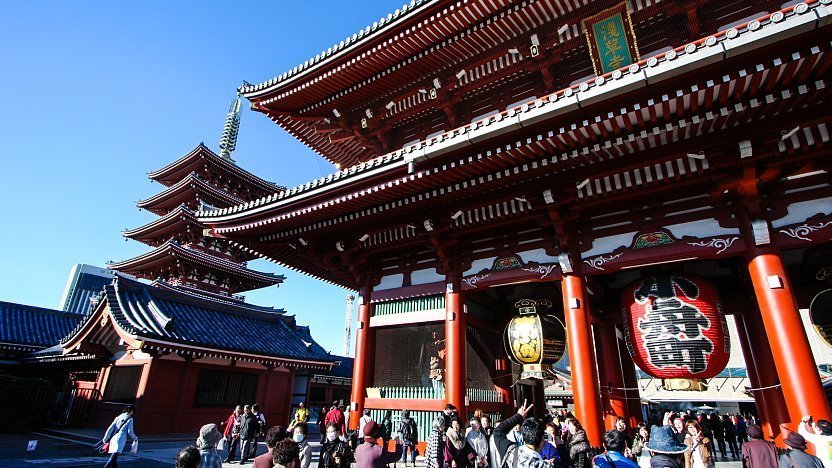Japan is a country where ancient traditions coexist with futuristic innovation. From serene temples and cherry blossom-lined streets to neon-lit cities and cutting-edge technology, Japan offers an unforgettable experience for every traveler. Whether you're visiting for cultural immersion, breathtaking scenery, or world-class cuisine, this guide will help you navigate the best that Japan has to offer.
1. Top Destinations in Japan
1.1 Tokyo – The Ultimate Megacity
Japan’s bustling capital blends modern skyscrapers with historic landmarks:
Shibuya Crossing – Experience the world’s busiest pedestrian crossing.
Shinjuku Gyoen – A stunning garden perfect for cherry blossom viewing.
Sensō-ji Temple – Tokyo’s oldest temple, located in Asakusa.
Akihabara – The heart of anime, gaming, and electronics culture.
Tsukiji Outer Market – A paradise for sushi lovers.
1.2 Kyoto – The Cultural Heart of Japan
Kyoto is famous for its well-preserved historical sites:
Fushimi Inari Shrine – Walk through thousands of vermillion torii gates.
Kinkaku-ji (Golden Pavilion) – A stunning gold-leaf-covered Zen temple.
Arashiyama Bamboo Forest – Wander through towering bamboo groves.
Gion District – Spot a geisha in Kyoto’s traditional entertainment quarter.
1.3 Osaka – The Food and Entertainment Capital
Osaka is known for its lively atmosphere and delicious cuisine:
Dotonbori – A neon-lit street filled with restaurants and entertainment.
Osaka Castle – A historic fortress surrounded by beautiful gardens.
Universal Studios Japan – A must-visit for theme park enthusiasts.
Shinsekai – A retro district with old-school charm and local eateries.
1.4 Hiroshima – A City of Peace and Resilience
A place of reflection and historical significance:
Hiroshima Peace Memorial Park & Museum – A tribute to the atomic bomb victims.
Miyajima (Itsukushima Shrine) – The famous floating torii gate.
1.5 Hokkaido – A Nature Lover’s Paradise
Perfect for winter sports, hot springs, and stunning landscapes:
Niseko – One of the world’s top skiing destinations.
Furano & Biei – Famous for rolling lavender fields and picturesque hills.
Shiretoko National Park – A UNESCO World Heritage site with untouched wilderness.
1.6 Okinawa – Japan’s Tropical Escape
For sun, sea, and unique island culture:
Ishigaki & Miyako Islands – Pristine beaches and crystal-clear waters.
Shurijo Castle – A glimpse into Okinawa’s Ryukyu heritage.
2. Japanese Culture & Traditions
2.1 Festivals & Celebrations
Cherry Blossom Festivals (Hanami) – Enjoy springtime sakura blossoms in parks.
Gion Matsuri (Kyoto, July) – One of Japan’s most famous traditional festivals.
Snow Festival (Sapporo, February) – See incredible ice and snow sculptures.
Tanabata (Star Festival) – A summer celebration based on a romantic legend.
2.2 Traditional Experiences
Tea Ceremony – Participate in an authentic Japanese tea ritual.
Samurai & Ninja Museums – Learn about Japan’s legendary warriors.
Ryokan Stay & Onsen Bath – Experience traditional Japanese inns and hot springs.
3. Japanese Cuisine: A Foodie’s Dream
Japan is a paradise for food lovers, with each region offering unique flavors. Must-try dishes include:
3.1 Tokyo & Kyoto – Sushi & Kaiseki Ryori (Multi-course traditional Japanese meal).
3.2 Osaka & Hiroshima – Okonomiyaki & Takoyaki (Savory pancakes & octopus balls).
3.3 Hokkaido – Ramen & Seafood (Miso ramen, fresh crab, and uni).
3.4 Okinawa – Goya Champuru & Soki Soba (Bitter melon stir-fry & Okinawan noodles).
For a unique experience, try:
Vending Machines & Konbini (Convenience Stores) – Find surprising gourmet treats.
4. Essential Travel Tips for Japan
4.1 Best Time to Visit
Spring (March–May) – Cherry blossom season.
Autumn (September–November) – Stunning fall foliage.
Winter (December–February) – Great for skiing and hot springs.
Summer (June–August) – Festivals and beaches, but hot and humid.
4.2 Visa & Entry Requirements
Many nationalities can enter Japan visa-free for up to 90 days.
JR Pass – Consider this for unlimited train travel across Japan.
4.3 Transportation
Shinkansen (Bullet Train) – The fastest and most scenic way to travel.
IC Cards (Suica/Pasmo) – Convenient for metro and buses.
Google Maps & Hyperdia – Essential for navigation.
4.4 Language Barrier & Communication
Learn basic Japanese phrases or use Google Translate & Voice Apps.
Pointing & Gestures – Many locals understand simple hand signals.
4.5 Payment & Currency
Japan primarily uses cash (Yen), though credit cards are becoming more common.
Suica/Pasmo cards can be used for transport and small purchases.
Final Thoughts
Japan is a land of contrasts—where ancient temples stand beside futuristic skyscrapers, and centuries-old traditions thrive in a society driven by innovation. Whether you're marveling at Mount Fuji, indulging in authentic ramen, or wandering through neon-lit streets, Japan guarantees an adventure of a lifetime.
Start planning your journey and get ready to explore the magic of Japan!













































0 Comments